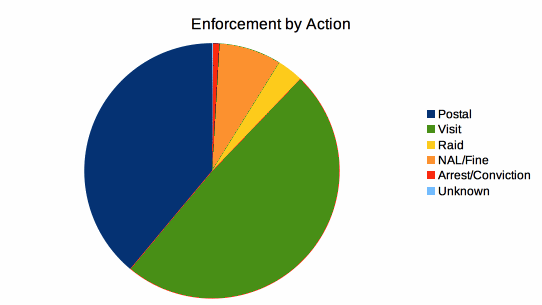Radio industry trades and watchdogs have played up last month’s raid and seizure of pirate station Datz Hits 99.7 FM in Boston. According to the FCC and Department of Justice, Datz Hits caused interference to a licensed commercial radio station as well as an air traffic control frequency at Boston’s Logan International Airport.
Said Enforcement Bureau Chief P. Michele Elison, “This is an important issue for licensed broadcasters and for the public in general, as both groups rely on the vigilance of the FCC to keep the airwaves free of interference. This enforcement action reflects our continued commitment to that objective.”
The raid was followed up with $15,000 fines for Datz Hits’ primary operators, Robert Brown and Lloyd Morris.
Station-raids are highly uncommon: the FCC, in conjunction with law enforcement, conducted just one last year and two the year before.
 It’s important to remember that the FCC’s enforcement authority has hard limits.
It’s important to remember that the FCC’s enforcement authority has hard limits.
Field agents have four basic tools in their kit: the station visit; the warning letter (otherwise known as a Notice of Unlicensed Operation); the Notice of Apparent Liability (warning of an imminent fine); and the monetary forfeiture (a bona fide fine).
The little-known secret of FCC enforcement is that in order to make any penalty stick, the agency requires the assistance of other federal entities. For example, the FCC can issue as many fines as it wants, but does not have a mechanism to actually collect them. To do so, the agency must engage a U.S. District Attorney to file a civil suit against the pirate to force payment.
Historically, the FCC manages to collect on less than half of the unlicensed broadcasting forfeitures it issues.
Same thing with station raids: FCC field agents are not police, thus the execution of a search-and-seizure warrant requires the presence of sworn law enforcement officers. This is why Florida and New Jersey have passed their own anti-pirate state laws that deputize local police to assist the FCC in its work (not that they help much).
The number of monetary penalties issued by the FCC is definitely on an upward trend. More than $200,000 worth of NALs have been issued to unlicensed broadcasters by field agents this year – nearly double the amount issued for all of 2010.
The typical monetary penalty for unlicensed broadcasting is $10,000, but that number is rising as well. Individual NALs have gone as high as $25,000 this year and are averaging about $15,000 per incident.
However, this doesn’t necessarily mean that the FCC is taking the “pirate problem” more seriously. The Datz Hits case languished for well more than a year – through multiple visits and monetary threats – before the FCC got assistance from the Department of Justice to close the station down.
Datz Hits got the hard treatment because its operators moved to new locations after FCC contact; ignored the agency’s threats of monetary penalties and – most importantly – operated a broadcast station without proper care for spectral integrity.
Although unlicensed broadcasting is illegal, without the widespread and committed support of other federal agencies the FCC’s enforcement muscle simply does not extend far enough to classify pirate broadcasting as a high-risk illicit activity.
In fact, observers of Boston’s radio scene say pirates continue to flourish there, even in the wake of a rare raid. The same can be said for other hot-spots, such as New York and south Florida.
So far this year, the FCC’s been active against radio pirates in 14 states, covering all broadcast bands. But the agency can’t make a real dent in the phenomenon without the extra muscle necessary to make its punishments stick. There is no real evidence to suggest that that’s happening.
Skip to content